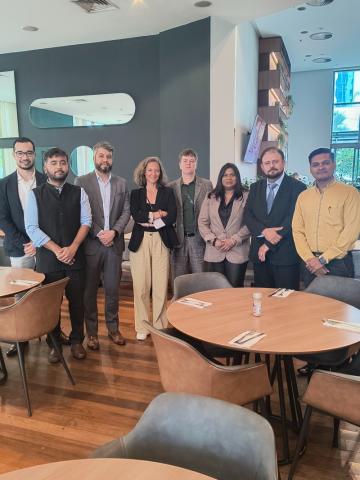TERI–Verra Dialogue Paves the Way for Inclusive Carbon Markets in India

At a meeting in São Paulo, the two organizations explored pathways to make carbon crediting more accessible and equitable for India’s rural and forest communities.
São Paulo, Brazil, 8 November 2025, 10:30 a.m. (BRT): A delegation from The Energy and Resources Institute (TERI) met with Verra, the world’s leading standard-setting body for voluntary carbon markets, to discuss the development of India-specific flexibility in carbon methodologies that can enhance inclusivity and enable broader participation of smallholders and forest-dependent communities in carbon finance.
The Verra team was headed by Ms Mandy Rambharos, Chief Executive Officer, Verra, and included Mr Cassio Souza (Director, Market & Client Relations), Ms Katie Goslee (Director, Forest & Blue Carbon, Program Development & Innovation), and Dr Marie Calmel (Director, NCS Program Quality).
Representing TERI were Dr Syed Arif Wali, Associate Director, Mr Sayanta Ghosh, and Mr Rachit Kumar, Associate Fellows, Land Resources Division, TERI.
Dr JV Sharma, Senior Director, Land Resources Division, TERI, and Mr Sandeep Roy Choudhury, Director, VNV Advisory Services, joined the session virtually.
The discussions covered the challenges and opportunities in implementing Afforestation, Reforestation and Revegetation (ARR) and REDD+ projects in India. TERI emphasized the need for context-specific methodological flexibility considering India’s fragmented landholding pattern, community forest governance, and degradation-dominated landscapes. The team called for a degradation-accounting tool under REDD+, the inclusion of conservation and fire-management activities in crediting, and the use of RS-GIS and AI/ML-based MRV systems for improved transparency. In ARR, TERI underlined that common practice should not be treated as perceived common practice and that post-intervention carbon stock gains should be prioritized.
Ms Mandy Rambharos appreciated TERI’s leadership and reaffirmed Verra’s commitment to advancing inclusivity. She noted that the latest ARR methodology already introduces improvements such as remote-sensing-based biomass quantification and an area-based approach for plots with more than 50 trees per hectare.
The meeting concluded with a shared commitment to continue collaboration between TERI and Verra toward developing flexible, context specific approaches & frameworks that may unlock India’s vast potential for carbon finance while benefiting marginal farmers and forest-dependent communities.
The meeting marks an important step toward developing India-specific flexibility in carbon methodologies to enhance inclusivity in carbon finance, particularly in the ARR and REDD+ sectors.
